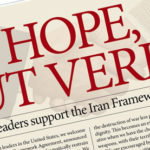To some, the term “Baptist peacemaking” conjures up images of President Jimmy Carter observing elections on troubled continents. For others, it means human rights activists brokering peace deals between warring factions in Africa or the Middle East.
 LeDayne McLeese PolaskiBut it involves more, said LeDayne McLeese Polaski, program coordinator for the Baptist Peace Fellowship of North America. Peacemaking also includes mentoring inner-city children and writing members of Congress about public policy issues.
LeDayne McLeese PolaskiBut it involves more, said LeDayne McLeese Polaski, program coordinator for the Baptist Peace Fellowship of North America. Peacemaking also includes mentoring inner-city children and writing members of Congress about public policy issues.
Basically, any action that promotes justice leads to peace, and that means a lot of Baptists and other Christians are peacemakers without even knowing it.
“Part of our job is to help others see what they are already doing and name it as peacemaking,” Polaski said. “A lot of churches are already doing something.”
The nature and state of Baptist peacemaking entered the spotlight with the April 26 death of Baptist theologian Glen Stassen, known for his writings and teaching on the ethics of war and peace.
 Kenyans participate in a freedom walk in Turkana, Kenya. (BPFNA photo)Stassen, who was 78 when he died in California, taught at Southern Baptist Theological and Fuller Theological seminaries, among other colleges and universities. He was for 30 years a leading voice for peace, and his groundbreaking book Just Peacemaking promoted positive and practical steps to end war.
Kenyans participate in a freedom walk in Turkana, Kenya. (BPFNA photo)Stassen, who was 78 when he died in California, taught at Southern Baptist Theological and Fuller Theological seminaries, among other colleges and universities. He was for 30 years a leading voice for peace, and his groundbreaking book Just Peacemaking promoted positive and practical steps to end war.
Stassen propelled Baptists into a Christian context where Mennonites and Quakers led the peace movement.
“Glen Stassen created a new tradition for peacemaking among Baptists,” said Robert Parham, the founder and executive director of the Baptist Center for Ethics and a former student of Stassen’s at Southern.
Parham and other members of an ethics course Stassen taught drafted a resolution in support of nuclear arms control the Southern Baptist Convention adopted in 1978.
Sign up for our weekly edition and get all our headlines in your inbox on Thursdays
Jesus’ Sermon on the Mount—and the conviction Christ’s followers should take it seriously—served as the core of Stassen’s theology on peacemaking, Parham said.
 Robert Parham“He challenged the common reading in many churches that (the sermon) was an idealistic statement,” he said. “Glen believed it was a realistic statement.”
Robert Parham“He challenged the common reading in many churches that (the sermon) was an idealistic statement,” he said. “Glen believed it was a realistic statement.”
He also lived out his theology, traveling the world as an advocate and activist for peace.
But Stassen’s single-minded focus on peacemaking didn’t make huge inroads in Baptist life, Parham said.
While working to educate and motivate Baptists to take a practical view of the Sermon on the Mount as the basis for peacemaking and human rights, he was limited by a denominational context “where Southern Baptist fundamentalists were more committed to Leviticus than the synoptic Gospels,” Parham asserted.
He also was challenged by a larger culture—reflected by his denomination—predisposed to the use of military force, he added.
“He created a new tradition of peacemaking among Baptists, but he was never successful in moving that tradition into the mainstream of Baptist churches,” Parham said. “Peacemaking remains on the outer circle of the Baptist moral agenda.”
 Jim JenningsBut some observers see reasons for optimism about the present and future of Baptist peace activism, noting an increasing presence of Baptists in ongoing campaigns.
Jim JenningsBut some observers see reasons for optimism about the present and future of Baptist peace activism, noting an increasing presence of Baptists in ongoing campaigns.
The Baptist World Alliance and the Baptist Peace Fellowship continue to do excellent work, while individual Baptist scholars and theologians are more and more involved in peace delegations to war-torn and hostile nations, said Jim Jennings, founder of Conscience International and a member of First Baptist Church in Gainesville, Ga.
In January, Jennings led a delegation of American scholars to Iran for talks with Iranian academics and government officials. One of the leading American delegates was Rob Nash of Mercer University’s McAfee School of Theology.
“I think that’s increasing incrementally,” Jennings said. There will be natural limits to that increase based on the attitudes of society.
“Baptists are a reflection of the political spectrum of our country—and probably in other countries as well.”
Personally, Jennings said his Baptist faith is a “100 percent” motivator of the peace and justice work he does around the world.
That work has taken him to Iran, Syria, the Sudan and Lebanon. He’s also met with “Islamic organizations that have intimidating names” to Americans.
“Everything springs out of a vision of peace that when Jesus says ‘blessed are the peacemakers,’ it is incumbent on us as Christians to follow that,” Jennings said.
Working for peace and justice can leave activists exhausted, Polaski acknowledged.
 “There are a lot who … are tired because they are working on issues that don’t get fixed in a lifetime,” Polaski said. “No matter how faithful you are, no matter how hard you try, you are not going to fix poverty.”
“There are a lot who … are tired because they are working on issues that don’t get fixed in a lifetime,” Polaski said. “No matter how faithful you are, no matter how hard you try, you are not going to fix poverty.”
But some Baptists are seeing behavioral change—particularly those who teach conflict transformation skills in settings ranging from American churches to villages in Africa.
“Peacemakers are people who respond to inevitable conflict in ways that go deeper, in ways that bring real healing and ways that bring real change,” Polaski said.
Baptist peacemaking continues to advance, she added.
“While some people are tired and frustrated because a lot of injustice is still out there, I also see people who are making a real difference every single day.”














We seek to connect God’s story and God’s people around the world. To learn more about God’s story, click here.
Send comments and feedback to Eric Black, our editor. For comments to be published, please specify “letter to the editor.” Maximum length for publication is 300 words.